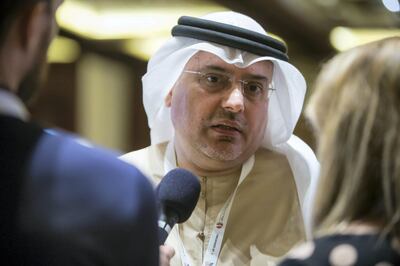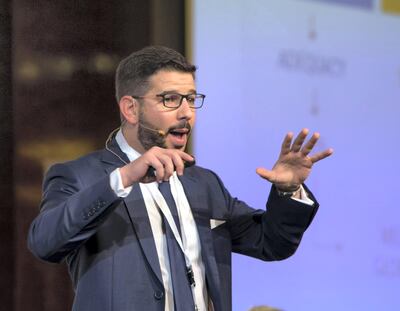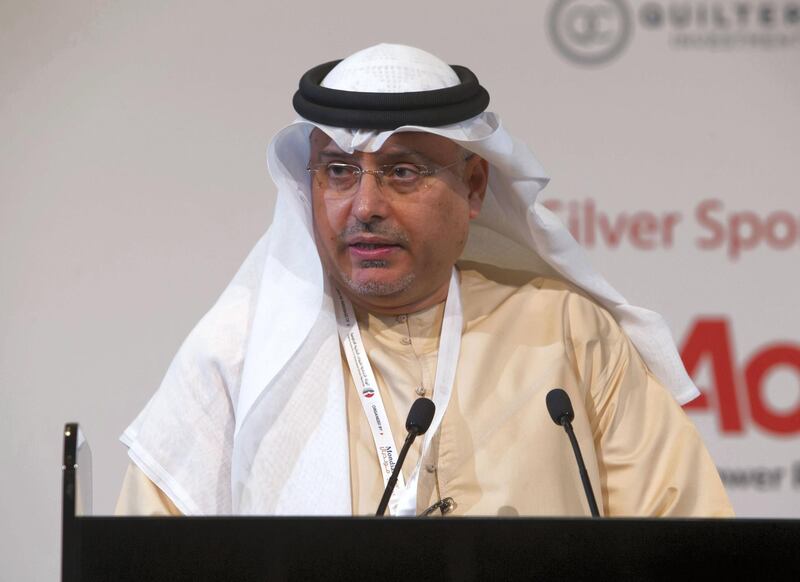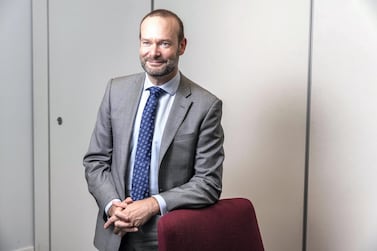The UAE plans to “enhance and improve” the end-of-service benefits awarded to employees to help companies attract and retain talent and ensure they can adequately fund the liability, according to a government official.
Abdulrahman Al Awar, director general of the Federal Authority for Government Human Resources, said studies are being carried out to improve the system, which could include a combination of an enhanced gratuity system and private sector employee savings schemes to boost employee benefits and the wider economy.
Mr Al Awar said the government was exploring “multiple policies” including models that differentiate on pay, without providing specific details or timeline for the implementation.
“The UAE has always protected the rights of the employees," said Mr Al Awar on Tuesday, on the sidelines of the Workers Incentives and End of Service Benefits Conference in Dubai, the first event of its kind in the UAE.
“There is obviously a great opportunity for those using [private sector] saving schemes to enhance the local economy, while also enhancing the benefits the employee will earn for their end of service in the UAE.”
According to 2018 data from global advisory and brokerage company Willis Towers Watson, a fifth of the country’s companies face end-of-service liabilities of $15 million (Dh55.1m) or more and 88 per cent of entities polled across the GCC have no plan in place to fund gratuities due.
Instead they settle the amount from funds as and when required – something Mr Al Awar said would also be addressed in the future.
“There is some best practices that can be carried out here," he said.
"Companies sometimes do not fund their liabilities in relation to their end-of-service benefits for their employees and introducing schemes that allow better governing of such liabilities will help those companies manage their balance sheet even better."
Analysts at the event said the end-of-service gratuity presents a challenge for expatriate residents as many consider it a bonus rather than a lump sum to be invested for the future to contribute to their retirement pot.
"Gratuities are a nice leaving bonus but they are not sufficient to pay for retirement needs," said Philip Rose, a chartered wealth manager at financial product promoter Halwyn. "Now we have the retirement visa at 55, residents are thinking about their long-term future and whether they could retire in the UAE. If they potentially want to do that, companies need to do something in addition to the gratuity to help employees plan for their long-term retirement because the gratuity is not designed to do that at the moment."
Mr Rose said the gratuity benefit also comes with risk as it is not mandatory for companies to set aside the payment.

Mr Al Awar said the government study on end-of-service benefits was revisiting policies and included discussions with “all relevant stakeholders” including the Ministry of Human Resources and Emiratisation, UAE pension funds, the private sector and employees.
He said any “change needs a lot of discussion” to ensure any model introduced is “governed properly”. “One box fits all is not the right way to go,” he added.

Mazen Abukhater, consultant and actuary at global consultancy Mercer, said a transition stage from the existing system would be gradual, “over a number of years ranging from 5 to 10 years”.
He said the UAE would ideally offer a scheme similar to Singapore’s Central Provident Fund, a compulsory comprehensive savings plan where employers and employees contribute to a central fund.
“The money is taken care of and invested in a very prudent manner, there’s governance, regulation on how these monies are disbursed, invested and how they are accumulating and then people’s benefits are protected and secured from their employers and the general economy," said Mr Abukhater.
This, he added, falls in line with a World Bank study, carried out a few years ago, which recommended a central scheme for the UAE, where the liability is removed from a company's balance sheet into a proper savings mechanism.
If the UAE migrates to a new system, he said in the initial stages there would be a legacy system and a new system.
“It needs to be done in a way that does not provide too much financial strain for employers because if you were to transition quickly, there would be a financial implication and that could be an issue if companies were not able to provide that level of cash upfront," said Mr Abhukhater.
Under the current system, employees leaving a UAE organisation are entitled to an end-of-service payment after completing at least one year of service with the tenure calculated on the number of days worked.
A recent study from financial services companies Old Mutual International and Quilter Cheviot found 59 per cent of UAE residents depend on their end-of-service gratuity payment to fund their retirement.
Any change from this defined benefit scheme – where the payout depends on length of service and salary at the time of leaving – would see the system change to a defined contribution scheme, which places the onus on the individual to save for their future.
Sean Kelleher, the chief executive of financial advisory firm Mondial, the organisers of the conference, said the Government recognised the need to change and diversify the economy.
"Ultimately the decisions will be made politically – but the reason we are working with FAHR is because they are keen on working on financial wellness and that is the first step in this plan, which is to make more of the end of service benefits and make sure expatriates leave the UAE with a lot of money."









